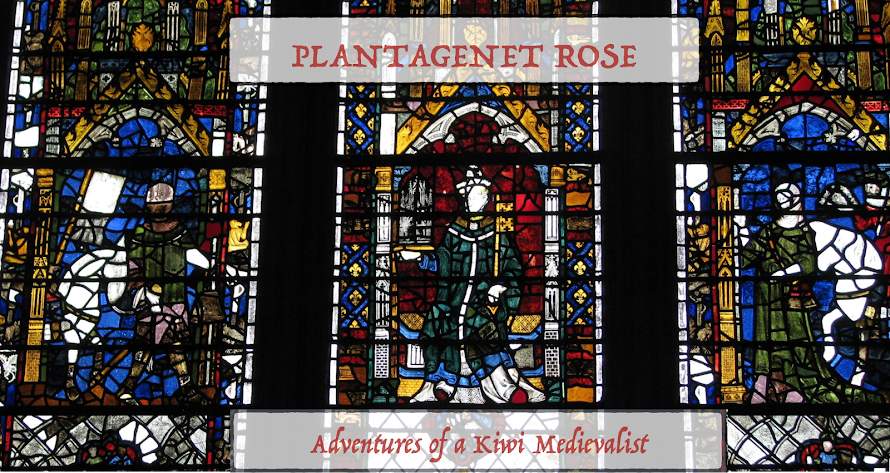This window is in the north aisle of All Saints North Street, one down from the Pricke of Conscience Window, and like the Pricke of Conscience window it is very famous. It shows the corporal acts (or works) of mercy by which medieval Catholics hoped to get to heaven. Oddly, however, it shows only six of the seven acts. (Perhaps the glazier thought that to show all seven would ruin the window's symmetry!)
The window was donated to the church in about 1410 by Nicholas Blackburn, who seems to have been one of York's most prominent citizens. Certainly he was an extremely wealthy merchant, since he donated not only the Corporal Acts of Mercy Window but also the Great East Window behind the altar.
Reading clockwise from the top left-hand panel, you can see the feeding of the hungry; giving drink to the thirsty; the shelter of the homeless; visiting the imprisoned (here shown in medieval stocks!); visiting the sick; and the clothing of the naked. (The seventh work, not shown, is to bury the dead.)
The man shown performing the works of mercy is probably intended to be Nicholas Blackburn himself. The window thus shows off not only his wealth but also his piety!
The bottom three panels, from left to right, show a kneeling monk or priest (possibly one endowed by Nicholas Blackburn to sing Masses for his soul); a floral (?) decoration; and a kneeling couple, probably Nicholas and his wife Margaret.
 |
| Visiting the poor unfortunates in the stock. Is the happy free gentleman on the left Nicholas Blackburn? |
Nicholas Blackburn was a Mercer (merchant), but whether he was a member of the York Mercer's Guild is not known. The guild does have a link with the window, however, since their play in the Corpus Christi pageant was Doomsday or the Last Judgement. The corporal works of mercy feature prominently in the play; they are the means by which Christ separates the good souls from the bad. To the good souls He says,
Whenne I was hungery ȝe me fedde;
To slake my thirste youre harte was free;
Whanne I was clotheles ȝe me cledde,
Ȝe wolde no sorowe vpon me see.
In harde presse when I was stedde,
Of my penaunce ȝe hadde pitee.
Full seke when I was brought in bedde,
Kyndely ȝe come to coumforte me.
Whanne I was wille and werieste,
Ȝe herbered me full hartefully;
Full gladde þanne were ȝe of youre geste,
And pleyned my pouerte piteuously.
[When I was hungry you fed me;
To ease my thirst your heart was free;
When I was without clothes you clad me,
You would no sorrow upon me see.
When I was hard pressed,
You had pity on my distress,
When I was sick in bed,
Kindly you came to comfort me.
When I was wandering and weary
You harboured me full generously;
Full glad were you of your guest,
And commiserated with my poverty.]
And to the bad,
Whanne I had mistir of mete and drynke,
Caytiffs, ȝe cacched me fro youre gate.
Whanne ȝe were sette as sirs on benke,
I stode þeroute, werie and wette;
Was none of yowe wolde on me thynke,
Pyté to haue of my poure state,
Þerefore till hell I schall you synke,
Weele are ȝe worthy to go to þat gate.
Whanne I was seke and soriest
Ȝe visitte me noght, for I was poure;
In prisoune faste whan I was feste,
Was none of you loked howe I fore.
Whenne I wiste neuer where for to reste,
With dynts ȝe draffe me fro your dore.
[When I had need of meat and drink,
Caitiffs, you drove me from your gate
When you were feasting and merrymaking
I stood without, cold and wet;
Not one of you thought of me,
Or had pity on my wretched state,
Therefore I shall sink you into Hell,
Well are you worthy to go to that gate.
When I was sick and sorriest,
You visited me not, for I was poor;
When I was held fast in prison,
None of you looked to see how I fared.
When I knew not where to rest,
With blows you drove me from your door.]
It is not known whether Nicholas was involved with the Mercers' play but his son (confusingly, also called Nicholas) was one of the station holders along the pageant route. This means that he paid for the plays to stop outside his door and was probably another sign of his wealth and prestige.
Maren Donley has produced an interesting, if rather involved, explanation of the links between the window, the Mercers, and Nicholas Blackburn. See Maren L. Donley, “Mercers, Mercantilism and the Maintenance of Power: the York Last Judgement and the York Register, Exemplar 18, no 2 (2006): 343ff.
Passages from the Last Judgement play in Richard Beadle, The York Plays: A Critical Edition of the York Corpus Christi Play as Recorded in British Library Additional MS 35290, volume I (Oxford: Oxford University Press, 2009), l.285-96, 325-38. Modern English translations my own.


No comments:
Post a Comment